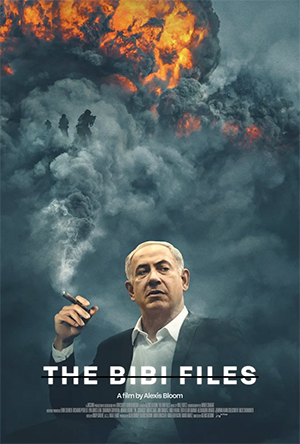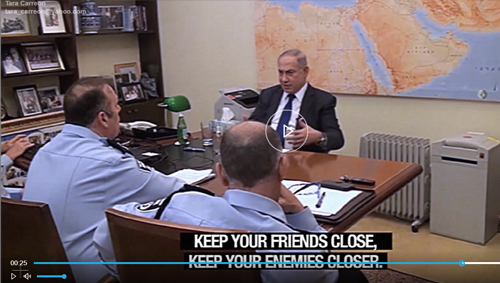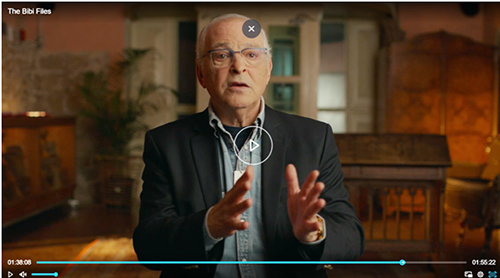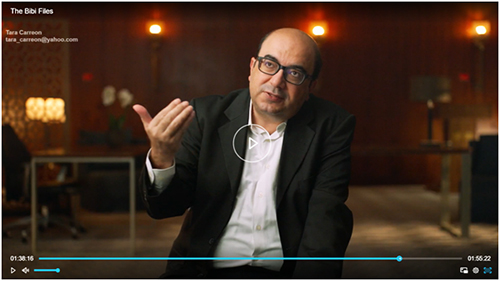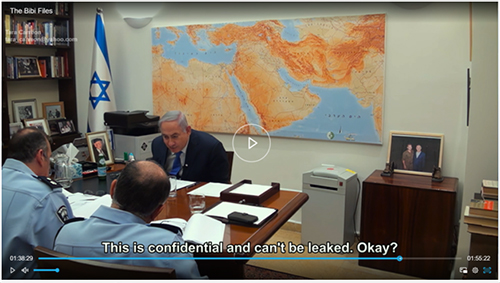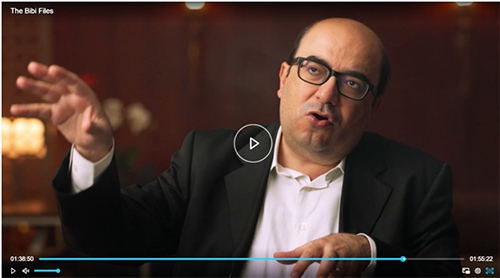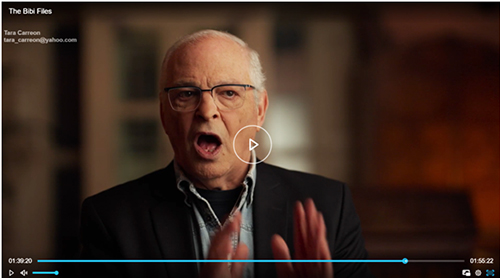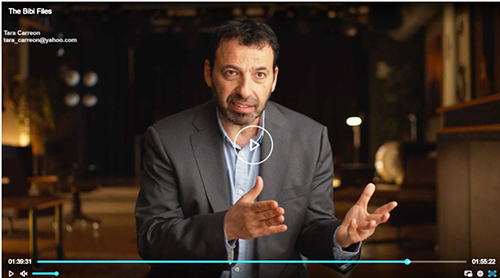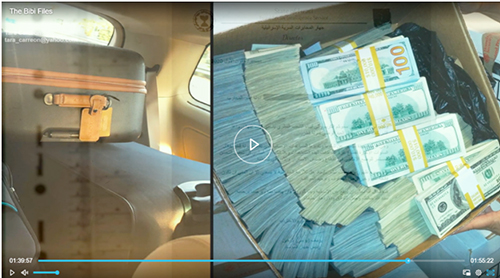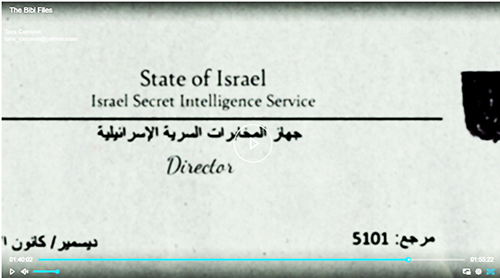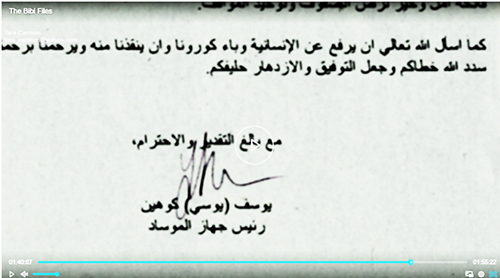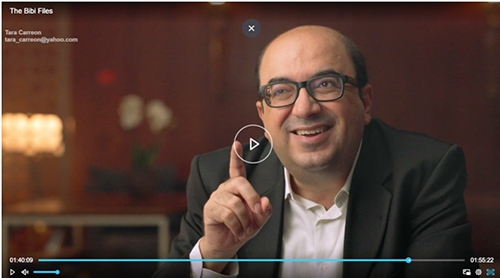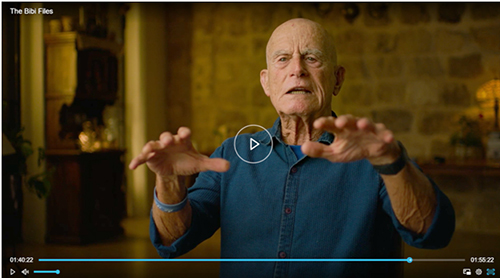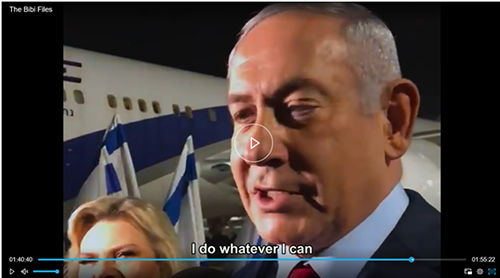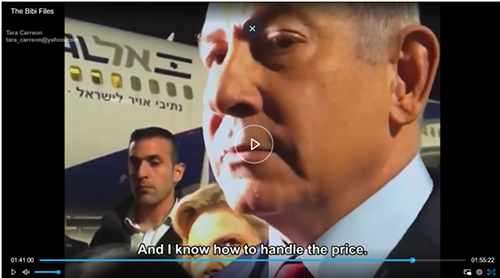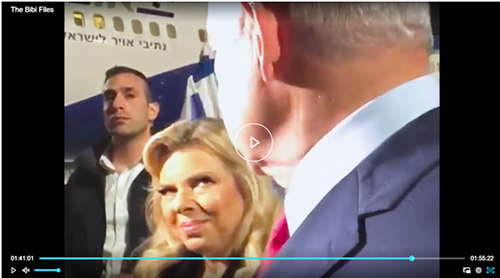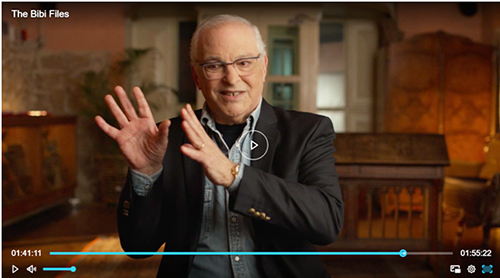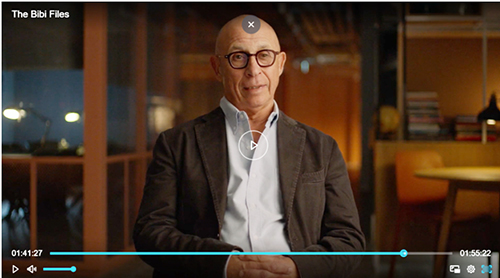01:37:31
[Bibi] Do you remember that line from The Godfather? “Keep your friends closer, keep your enemies closer? Lower the flames, maintain a conversation." I’ll give you an example. Today, with our enemies, we are in talks, and no one thinks we can manage to reach an agreement with them. But we control the height of the flames.
[Nimrod Novik, Former Advisor to Shimon Peres] The public blames Netanyahu for October 7th as the one who feeds the beast. He did not create Hamas, but he fed it.
[Sami Abu Shehadeh, Former Member of the Knesset] Netanyahu, who is against peace, and who was against having a Palestinian state, dealt with Hamas for a long time as a strategic friend.
[Bibi] This is confidential and can’t be leaked. Okay? We have neighbors here, sworn enemies. I’m constantly passing them messages. I confuse them, mislead them, lie to them, and then hit them over their heads.
[Sami Abu Shehadeh, Former Member of the Knesset] It was important for him to keep Gaza under the control of Hamas, and keep the West Bank under the control of Fatah, and prevent them from being united in any way. In order to do so, Netanyahu was all the time helping Hamas to survive.
[Nimrod Novik, Former Advisor to Shimon Peres] At the same time that he was under investigation, he arranged for Hamas to receive $35 million dollars every month from Qatar.
[Raviv Drucker, Investigative Journalist] Netanyahu can’t give the money by himself; Israel will not give money to Hamas; he can’t even transfer this money through the banks because even the banks do not want to cooperate. So in order for Israel to permit it, he needs to beg this small and very rich country, Qatar, to give money to our enemy.
[Sami Abu Shehadeh, Former Member of the Knesset] This suitcase of money was given to Hamas under the request of Benjamin Netayanhu personally. And because the Qatarians knew him from the beginning, they were asking him to send them his request in writing …
… because they knew that he’s going to lie in the future.
[Ami Ayalon, Former Head of Israeli Intelligence, Shin Bet] He allowed more than 1 billion dollars to be transferred into the hands of Hamas, because he believed that he can control the level of hatred. It’s nonsense. He cannot control the flames.
[Reporter] Mr. Prime Minister, what is your opinion of Qatari money entering Gaza? Will it help keep the calm in the Strip?
[Bibi] I do whatever I can in coordination with the security agencies to bring quiet back to the towns in southern Israel. Every step has a price, without exception, when you take steps as a leader.
There … Is .. Always … A … Price. If you cannot handle the price, you cannot lead. And I know how to handle the price.
[Nimrod Novik, Former Advisor to Shimon Peres] His strategy was, keep Hamas there, weaken the Palestinian authority on the West Bank, sustain the extremists, weaken the moderate – this exploded in our faces in the most brutal way on October 7th.
[Uzi Beller, Childhood Friend] Bibi tells the world, again and again and again, “I’m the expert on terrorism. I know how to fight terrorism. I’m the protector of Israel." And under his regime, we get into this incredible, unbelievable war.
-- The Bibi Files, A Film by Alexis Bloom
[Noura Erakat, Palestinian human rights attorney, legal scholar and assistant professor at Rutgers University] What I want to emphasize about Israel’s use of force is, within the framework of jus ad bellum [Jus ad bellum refers to the conditions under which States may resort to war or to the use of armed force in general. The prohibition against the use of force amongst States and the exceptions to it (self-defence and UN authorization for the use of force), set out in the United Nations Charter of 1945, are the core ingredients of jus ad bellum], Israel does not have the right to self-defense against a population that it occupies. It cannot usurp enforcement, law enforcement power from the native population, impose a siege, govern the airspace, govern the seaports, govern the perimeter, govern entrance and exit, govern how much caloric intake Palestinians have — and then shoot missiles onto a besieged population. It cannot do both. This has been established by legal scholars, such as Christine Gray, on the law of self-defense. It is an old trope that was condemned in the 1970s, when Portugal, South Africa and Israel tried to claim the right to self-defense in order to protect its colonial territories. You cannot dominate another people and then use the claim of self-defense in order to protect that domination. Israel is not protecting itself or its citizens. It is protecting its domination. It is protecting its occupation.
-- “It Is Apartheid”: Rights Group B’Tselem on How Israel Advances Jewish Supremacy Over Palestinians, by Amy Goodman
NERMEEN SHAIKH: And, Chantal, could you talk more about this issue of what the — Israel’s claim that they will take actions to make sure that Hamas does not pose a threat to Israel in any form? I just want to read a statement, because, of course, what we hear again and again in light of Hamas’s attack on October 7th is that Israel has the right to self-defense. And I just want to read a statement that U.N. special rapporteur on the Occupied Palestinian Territories, Francesca Albanese, recently made. She says that Israel cannot, quote, “claim the right of self-defense against a threat that emanates from the territory that it occupies, from a territory that is kept under belligerent occupation.”
So, if you could explain that and what the distinction is between two things, the fact that it is a territory that is occupied by Israel and, second, that Hamas is, of course, not a state? It is a nonstate actor that is considered by Israel, the U.S., the U.K. to be a terrorist organization. So what law applies in that case?
CHANTAL MELONI: Yes, exactly. It is very important to understand what is the law, the legal framework that applies to this, because Gaza is still part of the Occupied Palestinian Territory, and Israel, regardless of the disengagement — so, the occupation changed its form in the Gaza Strip since 2006, but it didn’t change substance, meaning that Israel is still exercising effective control on the Gaza Strip and its entire population by different means, not anymore with boots on the ground, but rather through controlling its borders, its aerial space, its sea and, of course, also the civilian life. We have to remember that even, you know, the civilian registries in Gaza are still basically kept by the Israeli authorities. And as you know, of course, no one gets in and out of Gaza. Not even the U.N. functionaries, not even international experts comes into Gaza if Israel do not allow this from happening. So this is why not the Palestinians, but also international bodies, the ICRC, the U.N., have considered, and also the International Criminal Court, that Gaza is still occupied territory. This means that Israel bears very specific duties and responsibilities with regard to the civilian population of Gaza. Not only they should not harm them, they should actually protect them. So, what we are witnessing in these weeks, but, honestly, what we have witnessed in particular since 2007 on, it’s a violation, grave violations of international humanitarian law, also taking into account the very strong duty that is placed on Israel as occupying power.
With regard to the specific question you were making, you were asking me about whether Israel can rely or not on self-defense with regard to Gaza and with regard to Hamas — not being, Hamas, a state, but a armed group that is considered to be a terrorist group internationally. So, I don’t think, honestly, that this is the most important legal point to be disentangled. It is a very complex legal point, but it is only — if you want, it is only relevant if we want to discuss whether Israel’s reaction to the grave crimes committed by Hamas on the 7th of October is an action of aggression or not. The point is that regardless of what we think in this regard — and I personally think that what Francesca Albanese, the U.N. special rapporteur, is arguing is absolutely reasonable and can be the line to be followed. But regardless of whether we agree with her and with other scholars on this point, the issue is that the response — so, what Israel is doing after the 7th of October in Gaza — is in grave violations of international humanitarian law, meaning the law, the rules that regulate war, the armed conflict. And so, this is, for me, the most important point to make. Regardless of the legitimacy or not of the intervention, we are witness these very grave crimes that can be analyzed under the lenses of war crimes, of crimes against humanity or, as we heard from Katie Gallagher and the CCR, genocide.
-- “Failure to Prevent Genocide”: Biden Sued as U.S. Provides Arms & Support for Israel’s Gaza Assault, by Amy Goodman, DemocracyNow!, 11/16/23
THE MOSSAD'S FALSE FLAG AL QAEDA CELL
Rashid Abu Shbak, the head of Palestinian Preventive Security in the Gaza Strip said on Friday, December 6, 2002 that his forces had identified a number of Palestinian collaborators who had been ordered by Israeli security agencies to "work in the Gaza Strip under the name of Al-Qaeda." Al-Jazeera TV reported that the Palestinian authorities had arrested a group of Palestinian "collaborators with Israeli occupation" in Gaza, who were trying to set up an operation there in the name of bin Laden's Al-Qaeda. The Palestinian Authority spokesman said the members of the group had confessed that they were recruited and organized by the Israeli intelligence, Mossad. Sharon had personally claimed on December 4, 2002 that he had proof of Al-Qaeda operations in Gaza, and used the allegations to justify brutal Israeli Defense Forces attacks in the Gaza Strip the next day -- which was the start of the Islamic holiday, Eid, celebrating the end of Ramadan. Ten civilians were killed in the IDF assaults. Reuters published an extensive featured story on the affair by Diala Saadeh on December 7, 2002, under the headline "Palestinians: Israel Faked Gaza Al Qaeda Presence." The article quoted President Arafat, who told reporters at his West Bank Ramallah headquarters, "It is a big, big, big lie to cover [Sharon's] attacks and his crimes against our people everywhere." Information Minister Yasser Abed Rabbo explained: "There are certain elements who were instructed by the Mossad to form a cell under the name of Al Qaeda in the Gaza Strip in order to justify the assault and the military campaigns of the Israeli occupation army against Gaza." (Haaretz, Reuters and Al Jazeera, December 7, 2002) Sharon is of course a past master of false-flag tactics like these, having been implicated in the direction of the Abu Nidal organization and also in the setting up of Hamas.
On Sunday, December 8, 2002, Nabil Shaath, the Palestinian Authority Planning and International Cooperation Minister, held a press conference with Col. Rashid Abu Shbak, head of the PA 's Preventive Security Apparatus in the Gaza Strip, to release documents and provide further information about the Israeli intelligence creation of a self-styled Al Qaeda cell. Shaath called on the diplomats to "convey to their countries that they assume the responsibility of exerting pressure on the Israeli government to stop the Israeli aggression," and announced that the PA had handed ambassadors and consuls of the Arab and foreign countries documents revealing the involvement of the Israeli Intelligence in recruiting citizens from Gaza Strip in a fake organization carrying the name of Qaeda. The goal of the operation was to create a new pretext for aggression against the inhabitants of the Gaza Strip. Shbak said that the PA had found eight cases of fake Al Qaeda recruiting over the previous nine months. Three Palestinians were arrested, while another 11 Palestinians were released, "because they came and informed us of this Israeli plot." The PA Security Service had traced mobile phone calls and e-mails, purportedly from Germany and Lebanon, back to Israel; these were messages asking Palestinians to join Al Qaeda. One e-mail even bore the forged signature of Osama bin Laden. "We investigated the origin of those calls, which used roaming, and messages, and found out they all came from Israel," Shbak said. The recruits were paired with collaborators in Gaza, and received money and weapons, "although most of these weapons did not work." The money was provided by collaborators, or transferred from bank accounts in Israel and Jerusalem. (Palestine Ministry of Public Information, Islam Online, December 9, 2002)...
Palestine -- After Israeli had occupied the west bank of the Jordan River, the Gaza strip and the Sinai peninsula in June, 1967, the Israelis found themselves ruling over some two million Palestinians. Under the United Nations system it is illegal to annex territory acquired through armed conflict without the approval of the United Nations Security Council, which in this case was not forthcoming. Rather, the UNSC passed resolution 242, calling on Israel to withdraw to the internationally recognized borders as they had been before June 1967. (In the run-up to the Iraq war, Bush spokesmen accused Iraq of having violated some 17 United Nations Security Council resolutions; they conveniently forgot that Israel was the all-time champion in that department, since Israel is currently in violation of some 30 UNSC resolutions regarded the territories it has occupied since 1967. But the US never proposed war to enforce compliance with those resolutions.) The Israeli occupation of conquered Palestine was oppressive and humiliating, and a national resistance soon emerged in the form of the Palestinian Liberation Organization. Its leader was Yassir Arafat, a secular nationalist more or less in the Nasser mold. Since the PLO had few weapons, and since the Israeli army was a dominant presence, the PLO began doing what the Jews had done between 1945 and 1948 against the British occupation of the same territory: they launched guerilla warfare, which the occupiers quickly labeled terrorism. The official Israeli line was that there was no Palestinian people, but this was soon disproved. From the beginning, the Israeli Mossad was active in conducting provocations which it sought to attribute to the PLO and its peripheries: attacks on airliners and on the 1972 Olympic games in Munich are therefore of uncertain paternity. The more horrendous the atrocity, the greater the backlash of world public opinion against the PLO. There is no doubt that the Mossad controlled a part of the central committee of the organization known as Abu Nidal, after the nom de guerre of its leader, Sabri al Banna. In 1987-88, just as the first Palestinian intifada uprising was getting under way, there emerged in the occupied territories the organization known as Hamas. Hamas combined a strong commitment to neighborhood social services with the rejection of negotiations with Israel and the demand for a military solution which was sure to be labeled terrorism. Interestingly enough, one of the leading sponsors of Hamas was Ariel Sharon, a former general who was then a cabinet minister. These facts are widely recognized; US Ambassador to Israel Daniel Kurzer, an observant Jew, stated late in 2001 that Hamas had emerged "with the tacit support of Israel" because in the late 1980s "Israel perceived it would be better to have people turning toward religion, rather than toward a nationalistic cause." (Ha'aretz, Dec. 21, 2001) In an acrimonious Israeli cabinet debate around the same time, Israeli extremist Knesset member Silva Shalom stated:"between Hamas and Arafat, I prefer Hamas ... Arafat is a terrorist in a diplomat's suit, while the Hamas can be hit unmercifully." (Ha'aretz, Dec. 4, 2001)
This tirade provoked a walkout by Shimon Peres and the other Labor Party ministers. Arafat added his own view, which was that"Hamas is a creature of Israel which, at the time of Prime Minister Shamir, gave them money and more than 700 institutions, among them schools, universities, and mosques. Even [Israeli Prime Minister] Rabin ended up admitting it, when I charged him with it, in the presence of Mubarak." (Corriere della Sera, Dec. 11, 2001)
With incredible arrogance, the Bush administration has pronounced Arafat as unfit to be a negotiating partner. In effect, they are choosing Hamas -- or worse, an act of incalculable folly for Israel and for the United States as well.
-- 9/11 Synthetic Terror Made in USA, by Webster Griffin Tarpley
AMY GOODMAN: I wanted to ask you if you could talk about Israel’s involvement in Hamas gaining power. In 2009, Avner Cohen, a former Israeli religious affairs official who worked in Gaza for over 20 years, told The Wall Street Journal, quote, “Hamas, to my great regret, is Israel’s creation.” Another former Israeli official, Brigadier General Yitzhak Segev, said he was given a budget to help finance Islamist movements in Gaza to counter Yasser Arafat and his Fatah movement. Another former Israeli military official, David Hacham, said, quote, “When I look back at the chain of events, I think we made a mistake. But at the time, nobody thought about the possible results.” Your response, Tareq Baconi?
TAREQ BACONI: Well, the origins of that is really Hamas emerged as an offshoot of the Muslim Brotherhood chapter in the Gaza Strip. And the Muslim Brotherhood chapter was not a political party. It was a social party. And its operations in the Gaza Strip and throughout the Palestinian territories were actually granted licenses by Israeli occupying forces at the time, so there was a license for the Muslim Brotherhood chapter to operate openly in the Gaza Strip. When Hamas was established in 1987 and became a political party and a military party that was engaged in active resistance against Israel’s occupation, the policies within the Israeli government shifted, and obviously it became less open to allowing Hamas to function. However, that did not deter Israeli authorities from encouraging and promoting divide-and-rule tactics between the Islamist national movement, so Hamas, and secular nationalism around Fatah. And this has always been a tactic that the colonial forces have used globally, and obviously Israeli colonialism is no different. So it has directly and implicitly attempted divide-and-rule policies.
This really turned and came to a head in 2007, when Hamas, after winning democratic elections in 2006, rose to power, and the Israeli authorities, along with the U.S., attempted to initiate a regime change operation, which facilitated a civil war between Hamas and Fatah and allowed Hamas to take over the Gaza Strip. Since then, Israeli authorities have actively embraced the idea that Hamas would be accepted as a governing authority in the Gaza Strip. Now, part of the calculus in that is because of Gaza’s 2 million Palestinians. This is a demographic issue. Israel wanted to sever the Gaza Strip from the rest of historic Palestine in order to reinforce its claim that it’s a Jewish-majority state. By getting rid of 2 million Palestinians, two-thirds of whom are refugees demanding return, Israel can claim to be both a Jewish state and a democracy and restructure what is its apartheid regime. Now, in order to do that, it acquiesced to maintaining Hamas in governance, and it claimed that it placed a blockade around the Gaza Strip because Hamas was in power. And obviously this was bought in the international community, using what we were just talking about, the idea that Hamas is a terrorist organization, axis of evil, and, therefore, that this blockade makes sense.
What policymakers don’t understand is that Israel has engaged in blockades around the Gaza Strip and attempted to get rid of the population in the Gaza Strip long before Hamas was even established as a party. But with Hamas’s takeover of the Gaza Strip, this created a perfect fig leaf for Israel to maintain the Gaza Strip as a separate strip of land. And to do that, it had to acquiesce and, in some ways, even enable Hamas to maintain its position as a governing authority there. And this also further reinforced its efforts to try to maintain division among the Palestinian leadership and play divide-and-rule policies between the PA and Hamas.
-- “Divide and Rule”: How Israel Helped Start Hamas to Weaken Palestinian Hopes for Statehood, by Amy Goodman
Ralph Nader: Let's talk about the gross undercount of the fatalities in Gaza. They're still talking about 24,000 fatalities, and they cite the Hamas Health Ministry.
Look at the reality here. Imagine if Philadelphia, which has 1.5 million people and is about the size of Gaza geographically, was subjected under siege to no food, no water, no medicine, no electricity, no fuel, and no health care, as an official policy of the attacker, and over 33,000 bombs and missiles were dropped on defenseless people in Philadelphia. Would anybody think that 99% of the people in Philadelphia would have still survived after 100 days?
Hamas seems to have an interest in lowballing its own fatalities, because it doesn't want to be criticized more by Gazans for not protecting them at all. What's your view of this undercount? And what do you think is the real minimal estimated casualty toll in terms of dead and injured?
Josh Paul: It's not just you who is saying there's an undercount. It's the Biden administration as well. Assistant Secretary of State for Middle East Affairs in the State Department (Near Eastern Affairs – NEA, Congresswoman Barbara Lee actually testified to Congress in November that she believes that the count being put out by the Hamas-controlled Ministry of Health in Gaza is an undercount. The Biden administration agrees with you that we are not capturing as many deaths as are occurring....
Ralph Nader: Let's go to the core of your expertise, Josh Paul. Over the years, there was an embargo on Gaza by Israel, which is considered illegal under international law. Given the Israeli surveillance technology of the Palestinians—considered by experts as the most advanced technological surveillance in the history of the world—how did Hamas get these weapons and the ammunition ready to use? Where did they come from? How did they get through?
Josh Paul: The best analysis coming out of the U.S. is that for the most part, these are weapons of Iranian origin and sometimes of North Korean origin and elsewhere from around the world. How they got through is a very good question, that speaks to the issue of Israel's siege on Gaza, which was intended to prevent this sort of flow of arms into the Gaza Strip....
Ralph Nader: Before a political solution, some people have spoken of a two-state solution, which Muslim countries have been proposing since 2002, in an open letter, and Israelis have been ignoring it. What do you make of Prime Minister Netanyahu's statements over time, including to his own Likud party in 2019, that the Israeli government is supporting and facilitating the funding of Hamas because Hamas doesn't believe in a two-state solution and can stop the Palestinian Authority from moving in that direction? This is an astounding position given Netanyahu's recent denunciation of Hamas. It seems like he enabled Hamas over the years. What's your reaction?
Josh Paul: That's exactly right. He has, and I think Israel has often played Hamas off against the Palestinian Authority (PA), while at the same time undermining the PA in every way it can, by withholding salaries and using the PA to pursue Israeli security objectives rather than Palestinian security objectives. That's a game that we, the United States, have played our part in.
There has been, in parallel with the expansion of settlements, with the continuation of the siege of Gaza, an effort to essentially deconstruct and divide, the State of Palestine, before one can even be established, to make it impossible to establish. That has been very much at the core of Prime Minister Netanyahu's policy, and it has blown back on him in some respects. And yet, it is hard to see how we go forward from here politically.
-- Conscientious Objector/Israel Agents, by Ralph Nader, Ralph Nader Radio Hour, Episode 515, January 20th, 2024
AMY GOODMAN: And finally, Tareq Baconi, if you could talk about, before October 7th, the Qatari government asking Netanyahu if they wanted Qatar to continue sending millions of dollars to Hamas — men would actually bring suitcases of money into Gaza — or if they should stop this? And according to the reports of a number of newspapers, they told them — he told them to continue. And also the role of the U.S. in asking Qatar to be the host of Hamas in order for it to negotiate?
TAREQ BACONI: Well, I mean, it’s precisely the point I was making. Now the Israeli media, Benjamin Netanyahu, certainly American media — obviously, with the exception of this platform — is on a rampage of trying to position Hamas as, and Yahya Sinwar specifically, as this image of evil, of this demon, the embodiment of evil that must be removed in order to maintain goodness in the world.
But as you say, go back just over a year, and the Israeli government was very happy to be actively engaged with maintaining Hamas as a government in the Gaza Strip, because their issue was never Hamas. Their issue was: How do they maintain Gaza as an enclave of more than 2 million Palestinians in a state of calm and in a state that does not challenge Israeli security? So the structure of apartheid, the architecture of apartheid, the blockade itself, was never in question. The question was: How do we stabilize the Gaza Strip so that it’s not a threat to Israel?
And so, that really — that goes to the heart of how Israel has been thinking about Palestinians, both in terms of the Netanyahu government and long before, which is that they have to be pacified, they have to be defanged, and they have to accept their lot that they’re living under apartheid indefinitely. Now, in order to achieve that, they worked with various Palestinian political leadership in this instance, including Hamas, to stabilize Palestinian enclaves under overarching Israeli rule. And the U.S. was not only happy with that, it was so convinced that this pacification of Palestinians was sustainable that they allowed Israel to sort of pursue negotiation agreements and ingratiate itself with the region. It was never an issue of dealing with the political demands at the heart of Palestinian liberation.
-- Tareq Baconi on Death of Hamas Chief Sinwar & Why Killing Palestinian Leaders Won’t Pacify Resistance, by Amy Goodman
****************************
Hanan Ashrawi & Rashid Khalidi: U.S. Backing Has Given Israel License to Kill & Maim Palestinians
by Amy Goodman
DemocracyNow
5/14/21
https://www.democracynow.org/2021/5/14/ ... id_khalidi
GUESTS
Hanan Ashrawi: Palestinian diplomat and scholar.
Rashid Khalidi: Edward Said professor of modern Arab studies at Columbia University.
LINKS
"What we're seeing now is just the latest chapter in Israel's dispossession of the Palestinians"
"The Hundred Years' War on Palestine"
Palestinian scholar Hanan Ashrawi says Israel’s latest assault on Gaza is turning life in the besieged territory into “sheer hell,” aided by U.S. military and diplomatic support. “Israel has total license to use unbridled power to kill and destroy and maim and get away with it,” Ashrawi says. We also speak with Rashid Khalidi, Edward Said professor of modern Arab studies at Columbia University, who says President Joe Biden’s continued defense of Israeli actions reflects long-standing erasure and dehumanization of Palestinians. “One wonders what proportion you have to have of Arab deaths, of Palestinian deaths, over Israeli deaths. Is it 20 to 1 before the United States finally begins to recognize that this is not legitimate self-defense?” Khalidi says. “This is a perfect illustration of the bias that has been a feature of American policy for many, many years.”
Transcript
This is a rush transcript. Copy may not be in its final form.
AMY GOODMAN: This is Democracy Now!, democracynow.org, The Quarantine Report. I’m Amy Goodman.
As we continue to look at Israel’s assault on Gaza and the Palestinian uprising, we’re joined by two guests. In New York, Rashid Khalidi is Edward Said professor of modern Arab studies at Columbia University. He’s the author of several books, including his latest, The Hundred Years’ War on Palestine. And in the West Bank city of Ramallah, Dr. Hanan Ashrawi joins us, longtime Palestinian diplomat and scholar, formerly an Executive Committee member of the Palestine Liberation Organization, the first woman to hold a seat in the highest executive body in Palestine. She also served as the official spokesperson of the Palestinian delegation to the Middle East peace process.
We welcome both of you back to Democracy Now! Let’s begin in Ramallah with Dr. Hanan Ashrawi. On Thursday, the Israeli Defense Forces, the IDF, put out a one-line tweet: ”IDF air and ground troops are currently attacking in the Gaza Strip.” Can you talk about what’s happening there now and the significance of both the attacks there and also the mob attacks throughout other parts of Israel and the Occupied Territories?
HANAN ASHRAWI: Yeah. Well, what the Israeli occupation forces did was once again target an area that is the most densely populated area in the world, that is under a state of siege. They have nowhere to go, nowhere to hide. They don’t have sirens. They don’t have shelters. They don’t have a air force. And, of course, they have no protection whatsoever. And they started bombing and shelling, by air primarily. And they destroyed three — first, three major high-rise buildings with residential apartments, and then they continued. This is a pattern that continued. They escalated. They’re destroying roads and streets, infrastructure, electricity and so on. And they’re turning life in Gaza, which was already a disaster area as a result of the siege — they’re turning it into sheer hell.
And as you’ve mentioned, there were so many people killed, it’s not — I mean, it’s difficult for us to talk about statistics, but when I read stories, when I see pictures of whole families, a mother and her three kids, bombed, shelled, destroyed, killed brutally in their own homes, in their own beds, this is what the reality of living under occupation is, under a state of siege, where Israel has total license to use unbridled power to kill and destroy and maim and get away with it.
And then you get people like Biden and others say Israel has the right to self-defense. I will repeat something I’ve said and I continue to say: There is no normalcy under occupation. This is an abnormal situation. And an occupier who’s oppressing a whole people cannot claim self-defense if its victims decide to strike back even in a minimal way. The real issue is the occupation.
Now we are seeing — not just in Gaza, we are seeing horrific scenes, of course, of death and murder and destruction. We are seeing also in the West Bank there are protest marches ongoing in every town, city and village. You’re seeing in Jerusalem, again, the Israeli border guards, the Israeli security are targeting individuals. They’re killing — they’re shooting at Palestinians. They have injured scores of them and arrested many. In historic Palestine, in what we call 1948 Palestine, which became Israel, the indigenous Palestinians again are being targeted. They are in a — they’re being beaten up, actually, by Jewish Israelis because they happen not to be Jewish, because Israel legislated a basic law called the nation-state law, in which it says only Jews have the right to self-determination, which meant even Palestinians who were in Palestine before Israel was created, and although they are Israeli citizens, have no rights whatsoever. This is legalized discrimination and apartheid, very clearly.
So, as a result of decades of discrimination and oppression and so on, the Palestinians in all major areas, cities, towns and so on, in '48 Palestine, are now protesting, because they are facing the violence of the Israeli — ironically, the Israeli settlers, who came from the West Bank. It's not enough that they’re stealing our land, that they’re illegally building colonies and settlements in the West Bank. They are fully armed. They are never held to account. And they are always protected by the Israeli army in the West Bank. Now they have been imported, particularly the most extreme, racist wing, the Lehava group, that has been emboldened by and adopted, actually, by Netanyahu. And they are wreaking havoc within Israel, within what they call the mixed towns and cities, wherever they can find Palestinians, even though they are supposed to have the same passports or nationality as Israelis. They are totally vulnerable. And the Israeli security — Netanyahu actually also imported not just the settlers into Israel, but also the border guards, which means he is treating all of historical Palestine like an occupied territory. He’s treating Lydda, Ramle, Akka, Haifa, Jaffa, all these towns and villages, as though they are part of an occupied territory, which means Israel is reoccupying Palestine. This is a pattern.
But now it has come to a head because now Palestinians everywhere are united in their opposition to oppression, to injustice, to violence, to cruelty and brutality. You have them, as I said, in the West Bank, including Jerusalem, in the Gaza Strip and within Israel, '48 Palestine, and all over the world. Now Palestinians in the States and in Washington and Manhattan, New York, in Chicago, in different places, are also protesting, along with their allies, along with this amazing solidarity network that is emerging in the U.S., as well as in Europe and in the Arab world. So, there is this unity of identity, unity of struggle, despite the differences of injustice. It's not — you can be under occupation, you can be suffering also from discrimination and apartheid, you can be facing an army, you can be suffering exile, dispossession and refugee status, but you all know that the source of your oppression is the same. And that’s why we [inaudible] —
AMY GOODMAN: Well, I wanted to bring — I want to bring Professor Khalidi into this conversation. And he’s here in New York. And speaking of the United States and its role, I wanted to play a clip of President Joe Biden reiterating his support for Israel’s military attack on Gaza, shrugging off concerns over the mounting Palestinian death toll.
PRESIDENT JOE BIDEN: And one of the things that I have seen thus far is that there has not been a significant overreaction.
AMY GOODMAN: Biden did not mention Palestine or Palestinians during Thursday’s remarks from the White House. And the Biden administration has stopped the United Nations on several occasions this week, the Security Council, from taking up a resolution. Can you talk about this, Professor Khalidi?
RASHID KHALIDI: Yeah. Well, one wonders what proportion you have to have of Arab deaths, of Palestinian deaths, over Israeli deaths. Is it 20 to 1 before the United States finally begins to recognize that this is not legitimate self-defense? We’re currently at about 11 to 1, 119 Palestinians killed in Gaza as against nine Israelis. And the biased rhetoric from American leaders, American politicians continues. I think that this is a perfect illustration of the bias that has been a feature of American policy for many, many years. You have in Washington an entrenched view, going back to what Hanan just said and what Representative Tlaib just said, that the Palestinians are less than human, are not important, they don’t really count. Thirty-one children have been killed. One Israeli child has been killed. Any child being killed is a tragedy. But that does not penetrate the consciousness of the politicians who make statements like this, whether the president or the secretary of state or the secretary of defense. And I think it’s tragic that a country that claims to be in support of human rights universally should basically consider a whole group of people less human and less entitled to rights.
I think that what’s happening all over historic Palestine today has brought us back to basics. I mean, it’s really tragic that it should have taken this kind of ordeal for everybody, but in particular for Palestinians. But it has brought us back to the understanding that things that were done back in 1948, things that have been done since 1948, whether the occupation of '67 or whether the Nakba of 1948, have echoed and echoed and echoed down to the present, what happened in Jerusalem in Al-Aqsa, what happened in Sheikh Jarrah, what's happening now.
Gaza is not just 2 million people in a strip of land 356 square miles. These are people who were driven from their homes in 1948 and who have been denied permission to return to those homes and have been stripped of their property by Israeli laws. Nobody talks about this in Washington. Nobody talks about the fact that — a terrible attack on a synagogue, which happened, for example, in Lod, a city that Israelis call Lod, has been featured in all the American media. The third-holiest mosque in Islam, built in the eighth century, has been attacked repeatedly. Stun grenades, tear gas bombs have been fired into the precincts of the mosque as worshipers are praying in Ramadan. I haven’t heard a peep out of an American official about this.
So, we’re really talking about something that at the top, at least, of the American political pyramid, in my view, is really quite disgraceful. And I think things are changing at the bottom. I think people are fully aware of the complete iniquity in the way in which the United States deals with this. And I think they’re beginning to be aware of the fact that the American weapons being used to kill 31 children in Gaza and another 80 people, others, most of them civilians, are being used in violation of U.S. law. U.S. law dictates that those weapons be used solely for defensive purposes. So, when American officials bleat about Israel is engaged in self-defense, what they’re doing is not just protecting Israel, they’re protecting themselves, because otherwise those arms sales would be illegal, and they would be complicit in illegal actions. So, I think that it’s disgraceful that we should hear such statements. But it is really interesting that other voices are beginning to be heard in the United States and around the world protesting this.
AMY GOODMAN: Do you see a difference, Professor Khalidi, between the Trump administration and the Biden administration, between President Trump and President Biden, in dealing with Israel?
RASHID KHALIDI: Well, of course there are differences, but they play the same tune. They play it in a different register. The Trump administration essentially adopted the most extreme tenets of the most extreme Israeli government in history. It’s a government that intends to create one Jewish supremacy state in the entirety of what they call the land of Israel. That’s the Netanyahu agenda. And the Trump administration signed on to that completely.
This administration, however, is still committed to the same kind of bedrock inequalities that every American administration for decades has supported, whether this involves not talking about Palestinians at all, as no administration official has done all week, or whether this involves a kind of acceptance of Israeli terms, like Israel’s security. Israel’s security is seen to mandate the killing of 119 people, most of them civilians, a dozen women and 31 children. That kind of thing, it was shared — that kind of logic, I should say, is shared between all of the American administrations, really —
AMY GOODMAN: You talk about —
RASHID KHALIDI: — for many decades.
AMY GOODMAN: You talk about going back decades. I wanted to go back to 1986, what, like, more than 35 years ago, when then-Senator Joe Biden talked about U.S. support for Israel, saying if Israel did not exist, the U.S. would have to invent an Israel to defend its interests in the region. This is what he said.
SEN. JOE BIDEN: We look at the Middle East. I think it’s about time we stop, those of us who support, as most of us do, Israel in this body, for apologizing for our support for Israel. There’s no apology to be made. None. It is the best $3 billion investment we make. Were there not an Israel, the United States of America would have to invent an Israel to protect her interest in the region. The United States would have to go out and invent an Israel.
AMY GOODMAN: That was Senator Biden in 1986. Has he changed his view? And talk about what he is saying, Professor Khalidi.
RASHID KHALIDI: Well, what he’s saying is that Israel operates as a proxy of the United States in the Middle East. And what he’s also saying is, “Vote for me and continue to give me campaign donations.” That’s unspoken. And those two elements in support for Israel, both in the Democratic Party and in the Republican Party, have been constants.
The search for a strategic role for Israel sometimes has gotten pretty desperate, because Israel in fact harms American interests, in many cases, in the Middle East. But the pretext which, during the Cold War — Biden was speaking in ’86 at the very end of the Cold War. During the Cold War, it could be argued, “Well, Israel is an American proxy, and there are Soviet proxies,” and so on. Those feeble pretexts for arguing for a strategic role for Israel as benefiting the United States, those have disappeared since the Cold War.
Since then, unfortunately, the so-called war on terror has taken the place of that. And Israel has managed to merge into American concerns that were sparked by the 9/11 attacks and the rise of the Islamic State and so forth, in order to sell itself to Americans — Netanyahu is a master salesman in this regard — as a valuable ally in the war on terror. In fact, American support for Israel probably provokes a lot of terrorism. Israeli actions, we know, provoke resistance. Colonial settler regimes always provoke resistance. If you dispossess people, they’re going to resist. Native Americans did the same thing. Africans facing settler colonialism did the same thing. Palestinians have resisted. And this resistance, coded as terrorism, is then turned into a pretext for arguing that Israel is vital to American interests. Well, if you did not have this settler colonial process of dispossession, which has been going on since 1948, you would not have the resistance, and you would not have what is being called terrorism by American politicians.
AMY GOODMAN: Dr. Hanan Ashrawi, can you talk about what you think is going to happen over these next few days, and particularly tomorrow, the significance of the day, tomorrow, as well as these attacks happening during Ramadan and the end of Ramadan?
HANAN ASHRAWI: Well, of course, it’s expected. Tomorrow is the commemoration of Al-Nakba, in which — the date in which Israel was formally formed or created on the land of Palestine. But it’s not the beginning of Palestinian suffering, because the Zionist enterprise started way before that, and not just even with the Balfour Declaration of [ 1917 ] and so on. There has always been an attempt at dispossessing Palestinians, displacing them and replacing them with another nation.
And the extremist Zionist ideology actually gained more and more traction, and has been adopted now ’til now, in a process of negation of a whole nation — our land, our history, our culture, even our very physical presence, our identity — and replacing them, replacing us, with a new narrative, with a new people that came from outside Palestine, at the expense of the Palestinian people, without any kind of curbs or engagement or accountability.
So, to the Palestinian people, the date Al-Nakba signals a process. It probably is in the middle of this process, but it is always ongoing. And as you have seen in the protests in '48 Palestine, the Zionist ideology does seek to displace and replace a whole people. It is not — it is a settler colonial enterprise. It has acted [inaudible] protection as a colonial — a Western colonial outpost. It has been a functional state, let's say, for the remnants of Western colonialism. And the U.S. —
AMY GOODMAN: So, what do you think needs to happen now?
HANAN ASHRAWI: I think what needs to happen is to provide two things: Palestinians need protection in accordance with the law, and Israel needs accountability in accordance with the law. The problem is it has been emboldened. It has been given license to act with full impunity. It has become the primary source of identification and support, these refrains that Rashid talked about where — you know, Israel’s right to self-defense, which is absolutely bizarre and unconscionable. This is one thing, in addition to the fact that the pro-Israel lobby, as well as other factors, self-interest in terms of elections and so on — all these things have worked together in order to give Israel preferential treatment and immunity to act with full impunity. What needs to be done is to treat Palestinians with full recognition of our rights to freedom, to dignity, to live in our own land, to self-determination, actually, and to stop treating Israel as a country governed by international law and humanitarian law. This is one.
The U.S. — of course, we’re not going to expect miraculous transformations. We know that the Biden administration has bent over backwards now in order to prevent any kind of an intervention or engagement. Sending a sort of symbolic, let’s say, third-, fourth-level civil servant does not do anything — Hady Amr going to Israel or wherever — when Netanyahu clearly told the American administration, whether it’s the president or the secretary of state, that it’s none of your business. When they asked him to calm down on the issue of Jerusalem and the Al-Aqsa Mosque and Sheikh Jarrah evictions, he said, “We have the right to do whatever we want,” and told them very clearly, “It’s none of your business.” So you think Hady Amr is going to come and be listened to and has — or will have the full weight of the office? No, it’s clearly just a gesture, a symbolic gesture.
And, of course, Biden is looking internally at his own elections, at his own party’s elections, and he’s ignoring a whole body of a new conversation in the U.S. — the progressives, the minorities, women’s movements, LGBTQ, Black. Everybody is out there placing Palestine in the middle of a conversation of rights, of equality, of justice. And within the Democratic Party, they’re not just turning a blind eye, they are sort of closing off their ears, because they don’t want to hear. There are changes now. There’s a new conversation, a new language. Palestine is no longer taboo. It is part of the discussion. It is part of the global rights movement. We have allies.
And to add to what Rashid said, this unholy alliance between the U.S. and Israel historically has cost the U.S. a great deal. It has cost their credibility and standing and interests and quite often even lives, because when you have this obsessive support for a country that is creating a situation of extreme abnormality and injustice, and the occupation is in itself an abnormal state, a state of constant aggression, and yet it is getting cover and protection and it is getting emboldened — as we said, during the Trump administration, they became party to — they became actually partners in the crime of the Israeli occupation and annexation and so on. So, this does not in any way serve American interests. It may serve the interests of individuals who seek to get reelected on the basis of Palestine bashing and rendering the Palestinians invisible and silenced, and amplifying only the Israeli voice in a distorted way. But at the same time, the truth is coming out. You can no longer —
AMY GOODMAN: On that note, we have to end it there, but, of course, we’ll continue to cover what is happening and developments on the ground in Gaza, in the West Bank and in Israel, Dr. Hanan Ashrawi, Palestinian diplomat and scholar, speaking to us from Ramallah, and professor Rashid Khalidi, Edward Said professor of modern Arab studies at Columbia University. We’ll link to your op-ed in The Washington Post headlined “What we’re seeing now is just the latest chapter in Israel’s dispossession of the Palestinians.”

